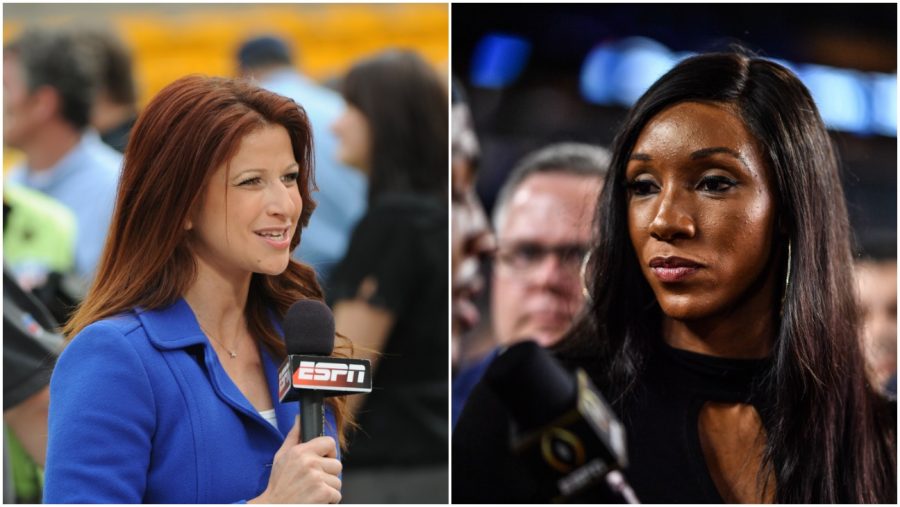Scandal, talent exodus: the steady decline of ESPN
Photo courtesy of The Hollywood Reporter
Scandal exploded earlier this month following leaked audio of ESPN’s Rachel Nichols attacking broadcast partner Maria Taylor.
Shocking audio leaked earlier this month of prominent on-air ESPN personality Rachel Nichols attacking fellow broadcaster Maria Taylor, claiming Taylor only had her spot on NBA Countdown because she was black and ESPN has diversity issues. The scandal following the leak led to Nichols being removed from NBA playoff broadcasts and Taylor leaving ESPN for NBC Sports.
The clip of Nichols venting to an ESPN higher-up about losing her spot to Taylor was recorded secretly and leaked, which to be fair, is an issue of privacy. I want to stress that the purpose of this article isn’t to condemn any one individual at ESPN. The larger issue here is the workplace culture of our largest sports news network, especially when it comes to racial sensitivity and diversity.
Which brings us to the current face of ESPN, Stephen A. Smith. A perennial workhorse and force of nature on broadcasts, his personality and charisma are usually more than enough to compensate for the station’s dull programming, but Smith also suffers from chronic flare ups of foot-in-mouth disease.
Smith’s two-decade-long career with ESPN has seen alarmingly bad takes on major issues. Perhaps most prominently his comments on the Ray Rice scandal, where he blamed Rice’s fiancee Janay for instigating the domestic violence that occurred in the infamous elevator security video.
His latest public-apology-worthy comments were xenophobic remarks made about MLB star Shohei Ohtani. Smith criticized the Japanese-born Ohtani for his use of an interpreter during interviews and argued that non-English speaking stars are one of baseball’s popularity issues. The diatribe was exceptionally tasteless considering recent increases in racially motivated violence, particularly against Asian Americans.
Now ESPN is not wholly responsible for what comes out of Smith’s mouth, and they have punished him before for outrageous remarks, but recurring issues with the company’s biggest star does call into question how serious ESPN takes issues like racial sensitivity.
This question becomes more relevant when one considers that Smith’s foot-in-mouth has spread to others at the station. Last week, following the Milwaukee Bucks’ NBA championship victory, ESPN NBA analyst Emmanuel Acho made close-minded remarks about Bucks’ star Giannis Antetokounmpo because of his nationality. Acho argued that despite Antetokounmpo being athletically gifted, hardworking and likeable, he couldn’t be the face of the NBA because fans wouldn’t relate to a Nigerian-born Greek man.
Inflammatory takes have become more common on ESPN’s programming over the past several years. As is the general trend with 24-hour cable news media, ESPN has shifted away from earnest reporting and nuanced commentary and are instead relying on clickbaity on-air antics and access to prominent individuals to maintain viewership.
Access-journalism is important to note here because it’s obvious that ESPN has been compromised as a news source due to their broadcast partnerships with enormous entities like the NFL and UFC. Among other things, the news station has been notoriously soft on NFL Commissioner Roger Goodell over issues like player health and wellness and the league’s response to Colin Kaepernick. Similarly, the station has given a pass to UFC President Dana White by toning down coverage of the promotion’s exploitation of fighters, recently letting top MMA journalist Ariel Helwani go because White didn’t like his coverage of the league.
Helwani’s exit was unfortunate, but not uncommon. Retaliation is the trend within ESPN’s hierarchy. When the company or their broadcast partners believe a prominent on-air personality has spoken out of turn, that journalist is reassigned and eventually let go. The optics of this are not good, especially when you consider that a lot of the talent being driven out are people of color. Taylor and Helwani obviously, but a litany of other prominent voices including Jemele Hill, Michael Smith and Dan Le Batard have all received the boot.
This practice of retaliation not only creates a toxic workplace, but it’s also weakened ESPN’s on-air product. The aforementioned exit of people of color has hurt the network, and certainly the network’s credibility. Combine that with the untimely deaths of broadcasters Stuart Scott and John Saunders, as well as the exodus of white talent like Bill Simmons, Ryen Russillo and Kenny Mayne, and it’s no wonder much of the network’s programming is near unwatchable.
ESPN has a diversity problem, problems with diversity in leadership and diversity in thought and opinions on issues that are vitally important to the times we’re living in. The company has cultivated a workplace that doesn’t encourage innovation and actively punishes talent for doing their jobs. There’s no reason two talented women like Taylor and Nichols should have to battle over one spot, and there’s no reason journalists like Helwani and Hill should be ousted for doing their jobs as journalists.
What we are seeing is that ESPN isn’t too big to fail, that they’re actively failing because of how big they are. Compromised by TV deals and stale leadership, they’re too big to be proactive, too big to stand with their broadcasters and too big to meet the times we’re living in.








